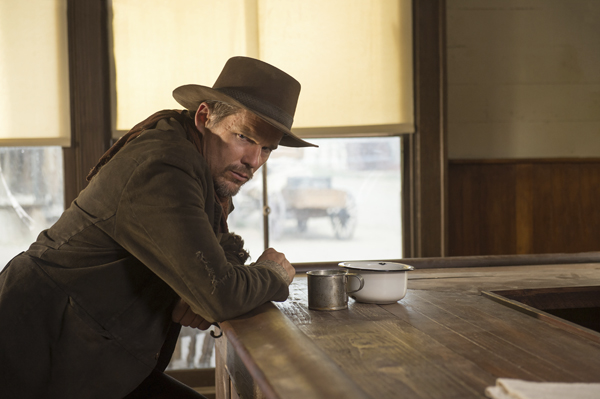Sometimes a movie comes along that isn’t great—in fact, it might not quite qualify as good—but there is a deliberate goofiness to it that vaults over your better instinct, and you kind of love it anyway. Like a puppy with a really bad haircut. Ti West’s western In the Valley of Violence is one such movie.
Here, like Tarantino, West (The House of the Devil) takes his inspiration from the spate of second-rate Hollywood and third-rate Italian spaghetti westerns of the late 1960s and early ’70s. By that time, all sense of seriousness was leached from the genre, and it was pretty much an excuse for folks to go hog wild. In Sabata, Lee Van Cleef teams up with a sequined gymnast, and in the lamented, half-finished but still wonderful The Deadly Trackers, erstwhile good guy Rod Taylor chews the scenery and his cigar as the evil villain. And my personal fave, Catlow, posits Richard Crenna and Yul Brynner as marshal and thief, respectively, and is more like Neil Simon with guns than a proper western. In a Valley of Violence follows happily in these films’ footsteps.
Ethan Hawke stars as a man with no name—that is, until about halfway through, when he utters it for the first time. Nothing fancy, just Paul. A former soldier, Paul is a man haunted. His only companion is his trusty dog, Abbie. When asked if Abbie does any tricks, Paul gamely replies, “She bites.”
Low on supplies, he heads into the town of Denton, population not very many. Here he gets on the wrong side of a hotshot in saloon named Gilly (played with manic comic gusto by James Ransome) and teaches him a quick lesson that leaves him with a broken nose. Little does Paul know that Gilly is the town deputy and son to the town marshal (John Travolta), who is helpfully named the Marshal. The Marshal lets Paul know in no uncertain terms that his reprobate son absolutely deserves a beatdown, and that Paul best head out of town and not return, or else.
Paul does so, but Gilly can’t let sleeping dogs lie and does something heinous to Paul and leaves him for dead. Of course, Paul lives and returns to Denton to unleash a can of whupass on Gilly and his buddies. Generally, this is when westerns get down to business. Paul should be a one-man killing machine. The Marshal should be the villainous, heartless obstacle that stands in his way. Now, Paul does get down to some killing, and he knows how to do it—he isn’t thrilled that he has to, but a man’s gotta do what a man’s gotta do when other men do mean things to man’s best friend. And the Marshal doesn’t want to kill this guy, but he doesn’t want his son killed either. So the shootout set piece is a negotiation, with a side helping of bullets and straight razors. And West is up to the task; he raises the tension while giving the villains a certain amount of depth and even, for a couple of them, remorse. You get the gore, because when you cut teeth on horror, it’s hard to resist.
The main misstep is the inclusion of two women, sisters who run the local hotel. One is the fiancée of the odious Gilly, and the other takes a shine to Paul and wants to make a good man out of him, even though Paul gently reminds her he’s old enough to be her father. The sisters are out of place: their inflections are modern, and their interaction consists of the bickering you find on sitcoms like Two Broke Girls. And when the actresses happen to be as good as Taissa Farmiga and Karen Gillan, you assume it’s not their fault that they are falling flat on their face. The film builds up a good head of steam that stops in its tracks when they show up, and then it lumbers up, starts moving along, and stops dead again.
Still, there is something about this ersatz western. It exudes a goofy charm, one that is not evident in West’s horror offerings. It’s enough to bring a certain amount of goodwill to the project and enough to recommend it in the long run.

















Leave A Comment